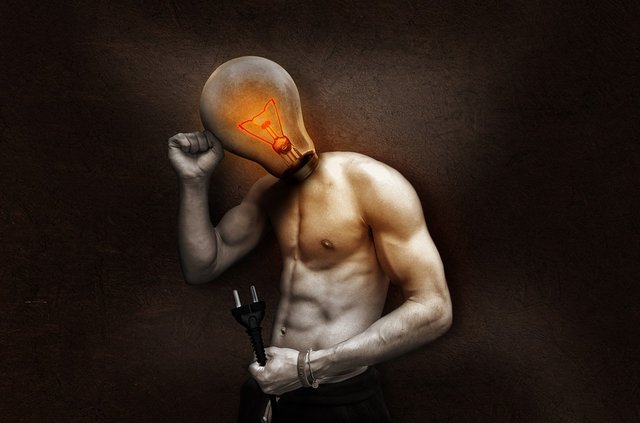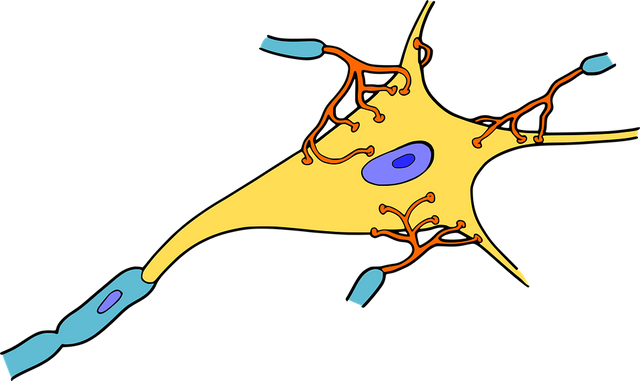Something you did not know about bone biology
Let’s be honest, we can all be wrong sometimes. Obviously, this is true also for scientists, but in their case, they often end up making interesting discoveries while testing wrong hypotheses. You can see it as a perk of their stressful job. Today, I want to talk about the testing of another wrong hypothesis that turned out better than expected.
As you may know collagen is a protein that can be found in almost any connective tissue in our body, yet scientists could not figure out why the collagen in bone can mineralize while the collagen in other tissues doesn’t. So scientists started looking at the behavior of cells that populate the bone, the osteoblasts, and in particular they noticed that osteoblasts secrete abundant amounts of a protein called osteocalcin (Karsenty and Olson 2016).
For this reason, scientists hypothesized that the secretion of osteocalcin must be responsible for the mineralization of collagen. The most obvious way to test this hypothesis was to engineer mice that did not express osteocalcin and mice that overexpressed it. However, neither groups showed any changes in mineralization in bone nor in any other tissue (Ducy et al. 1996; Murshed et al. 2004).
Instead, what the scientists noticed was that mice that did not express osteocalcin became fat. Not only, they also became late breeders and turned infertile much earlier than the wild-type mice. This does not sound like a good deal at all. However, this observation is telling us something very important which is that osteocalcin influences two vital processes in our body: fat accumulation and reproduction.
So, can bone cells really exert any other function other than making bone? Well, it appears bone exert also an endocrine role, in fact osteocalcin can be found in circulation at a concentration in the range of ng/mL (Gundberg et al. 1985; Hauschka et al. 1989).
Bone is indeed a very weird tissue. In fact, it’s the only tissue in our body that contains a cell type, called osteoclast, whose job is to destroy the very tissue in which they reside (Teitelbaum 2000). This is not just weird but also energetically expensive! Can you imagine how much energy we consume to destroy, clean up and rebuild bone, every day and in multiple locations in our body? In fact, food intake has profound effects on bone growth, it’s not a coincidence that malnutrition often results in kids that stop growing or adults that lose bone mass. If you consider this, than it starts to make sense that a protein produced in bone, the osteocalcin, can modulate our metabolism.
Now scientists had a second hypothesis to test, can bone really be an endocrine organ? This was something that was challenging to test in vivo, since there are several parameters that could affect energy metabolism, thus scientists decided to perform this experiment in controlled conditions. They isolated osteoblasts and co-cultured them in vitro in the presence of pancreatic islets (to test the effects on the secretion of insulin) or with adipocytes (to test the effects on adiponectin production) (Ducy et al. 2000; Elefteriou et al. 2005; Takeda et al. 2002; Yadav et al. 2009). As a control they performed the same experiments using fibroblasts instead of osteoblasts since they are closely related cells. What they found was that co-culture with osteoblasts stimulated the production of insulin and adiponectin, while co-culture with fibroblasts did nothing. In vivo studies also confirmed that mice that don’t express osteocalcin produce less insulin (Karsenty and Olson 2016). This time the hypothesis turned out to be right, bone is indeed an endocrine organ and it influences metabolism. Another study also found that male mice that lacked osteocalcin had low sperm count (Oury et al. 2011) while female mice without osteocalcin turned out to be extremely docile (Oury et al. 2011).
This is because osteocalcin can cross the blood-brain barrier and interact with serotonergic neurons inhibiting the synthesis of every monoamine neurotransmitters while stimulating the production of gamma aminobutyric acid (GABA), an inhibitory neurotransmitter (Oury et al. 2013).
Moreover, lack of osteocalcin does not just mess up the adults brain but it can also affect the brain development of fetus, in fact osteocalcin can cross the placenta and promotes the development of the hippocampus by preventing neural apoptosis (Oury et al. 2013).
Another interesting fact is that while osteocalcin increases energy expenditure and glucose uptake in peripheral tissues, insulin has also an effect in bone. It favors bone resorption (Ferron et al. 2010).
Earlier I mentioned also adiponectin, that also plays a crucial role in regulating bone formation (Kajimura et al. 2013).
Not many people know but bone seems to be truly one of the main endocrine organ in our body. It regulates metabolism, reproduction, behavior, it’s a store of minerals and all that on the top of the other well-known functions such as aiding us in our daily fight against gravity and enabling locomotion. Bone is certainly energetically expensive to maintain but it conferred our ancestors evolutionary advantages. Now we also know that because of its endocrine functions, bone can also help us survive in hostile environments by regulating our metabolism.
Logo made by @manuelcuda
References
- Ducy, P et al. 1996. “Increased Bone Formation in Osteocalcin-Deficient Mice.” Nature 382(6590): 448–52. http://www.ncbi.nlm.nih.gov/pubmed/8684484.
- Ducy, P et al. 2000. “Leptin Inhibits Bone Formation through a Hypothalamic Relay: A Central Control of Bone Mass.” Cell 100(2): 197–207. http://www.ncbi.nlm.nih.gov/pubmed/10660043.
- Elefteriou, Florent et al. 2005. “Leptin Regulation of Bone Resorption by the Sympathetic Nervous System and CART.” Nature 434(7032): 514–20. http://www.ncbi.nlm.nih.gov/pubmed/15724149.
- Ferron, Mathieu et al. 2010. “Insulin Signaling in Osteoblasts Integrates Bone Remodeling and Energy Metabolism.” Cell 142(2): 296–308. http://www.ncbi.nlm.nih.gov/pubmed/20655470.
- Gundberg, C M, M E Markowitz, M Mizruchi, and J F Rosen. 1985. “Osteocalcin in Human Serum: A Circadian Rhythm.” The Journal of clinical endocrinology and metabolism 60(4): 736–39. http://www.ncbi.nlm.nih.gov/pubmed/3871789.
- Hauschka, P V, J B Lian, D E Cole, and C M Gundberg. 1989. “Osteocalcin and Matrix Gla Protein: Vitamin K-Dependent Proteins in Bone.” Physiological reviews 69(3): 990–1047. http://www.ncbi.nlm.nih.gov/pubmed/2664828.
- Kajimura, Daisuke et al. 2013. “Adiponectin Regulates Bone Mass via Opposite Central and Peripheral Mechanisms through FoxO1.” Cell metabolism 17(6): 901–15. http://www.ncbi.nlm.nih.gov/pubmed/23684624.
- Karsenty, Gerard, and Eric N Olson. 2016. “Bone and Muscle Endocrine Functions: Unexpected Paradigms of Inter-Organ Communication.” Cell 164(6): 1248–56. http://www.ncbi.nlm.nih.gov/pubmed/26967290.
- Murshed, Monzur, Thorsten Schinke, Marc D McKee, and Gerard Karsenty. 2004. “Extracellular Matrix Mineralization Is Regulated Locally; Different Roles of Two Gla-Containing Proteins.” The Journal of cell biology 165(5): 625–30. http://www.ncbi.nlm.nih.gov/pubmed/15184399.
- Oury, Franck et al. 2011. “Endocrine Regulation of Male Fertility by the Skeleton.” Cell 144(5): 796–809. http://www.ncbi.nlm.nih.gov/pubmed/21333348.
- Oury, 2013. “Osteocalcin Regulates Murine and Human Fertility through a Pancreas-Bone-Testis Axis.” The Journal of clinical investigation 123(6): 2421–33. http://www.ncbi.nlm.nih.gov/pubmed/23728177.
- Takeda, Shu et al. 2002. “Leptin Regulates Bone Formation via the Sympathetic Nervous System.” Cell 111(3): 305–17. http://www.ncbi.nlm.nih.gov/pubmed/12419242.
- Teitelbaum, S L. 2000. “Bone Resorption by Osteoclasts.” Science (New York, N.Y.) 289(5484): 1504–8. http://www.ncbi.nlm.nih.gov/pubmed/10968780.
- Yadav, Vijay K et al. 2009. “A Serotonin-Dependent Mechanism Explains the Leptin Regulation of Bone Mass, Appetite, and Energy Expenditure.” Cell 138(5): 976–89. http://www.ncbi.nlm.nih.gov/pubmed/19737523.
 Immagine CC0 Creative Commons, si ringrazia @mrazura per il logo **ITASTEM**.
**CLICK HERE AND VOTE FOR DAVINCI.WITNESS**
Immagine CC0 Creative Commons, si ringrazia @mrazura per il logo **ITASTEM**.
**CLICK HERE AND VOTE FOR DAVINCI.WITNESS**





Mi ha tenuta incollata dall'inizio alla fine, molto scorrevole, chiaro e interessante:)
Ti ringrazio :)
wow
thanks for info
good luck
So, any bone disease have effects that could be directly related to an endocrine disorder?
Yes, probably more than what we originally thought
Thanks ever such a lot. A great post ever. <3
Interesting. Are the bones more fragile if a person suffers from diabetes?
Yes, diabetic people will surely have issues related to bone density since insulin can affect bone formation
The coolest aspect of science!
Really nice post!
:) thanks
Grandissimo post, ben fatto,ben scritto! Un saluto @giornalista
Grazie :)
That's so cool! I'll be honest I thought I pretty much knew everything about bone till I read this. I know the mechanism of bone mineralization and reabsorbtion by osteoblasts/ clasts down to ALP. But I'd never even considered bone may have an endocrine aspect :)
Many people don't know about it, I'm glad you found the post informative :)
I will admit I haven't got a clue about bones, but I read the whole post. Really good night read :D
Science is intriguing, some facts here like 'osteocalcin influences fat accumulation and reproduction' were so amazing, got me hooked up on the post! :D
Anyway, Keep it up!